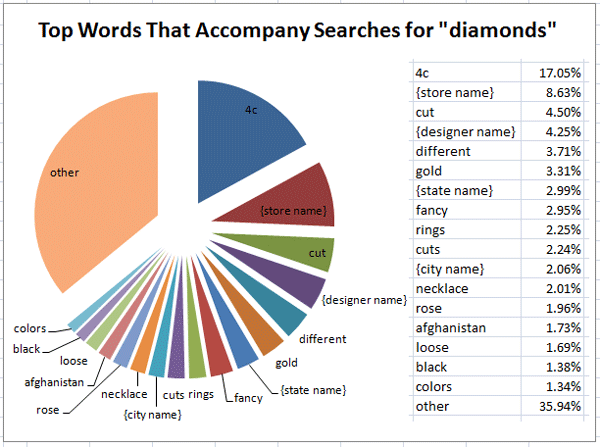
Last month, I spent a lot of time analyzing the keyword data I collected during the 2015 holiday season. The information that surfaced was just the tip of the iceberg that I had, but it would take months to go through and write about it all, so I limited my analysis to the list this list:
- Overview of general keywords
- Diamonds vs. Diamond keywords
- Engagement ring keywords
- Engagement rings keywords
- Fine jewelry keywords
- Jeweler vs. Jewelers keywords
Ultimately, the reason I worked through all that was to give you the groundwork for today's Daily Golden Nugget about topics, not keywords. You see, it's been my opinion for quite a while that you should be writing about topics, not keywords, everyone talks about ranking highly for particular keywords without paying attention to whether or not Google believes you are an authority in your field.
Be the Authority
What separates you from your local and online competition? Every business owner has something that they are an absolute expert in. It could be something simple like sizing a ring, or it could be as complicated as designing a ring and carving it by hand. Whatever it is, there's probably that one thing in business that you know you can do better than anyone else, and it makes you upset when you hear of people who didn't come to you first.
The problem is that no one knows about your expertise unless they are referred by a friend or happen to walk into your store one day. Your advertising does not help to build authority, although repeating ads over a long term has been known to build trust. However, Google doesn't fall prey to the repeated ads techniques, it relies on the information it finds online about you.
Google's measurement of authority is derived from the information you have on your website and how it's organized. That organization comes from your blog and from different sections of your website. This is where your website navigation also comes into play, and it's why silo architecture that I explained here and here a while back is a valuable method of website design.
Websites Built for Topics
Once only a pastime for people with passions, blogging has grown into the most convenient way to add content to your website in the form of written words which Google can analyze. Naturally, many SEO agencies have abused blogging techniques by creating a lot of thin content with little value. For quick reference, "thin content" is a page with fewer than 200 words on it; usually poorly written, too.
Instead of writing short blog posts, each of them should go into some detail about a few focused keywords that are part of a bigger topic. When you write only about a few focused keywords at a time, you will naturally need to write several blog posts in order to fully cover that topic. That's how your authority is built. The more you've written about a topic, the more your expertise will shine through to both customers looking for your service and to Google.
Although most people will simply add this topic content to the blog area of their website, you can also add it to landing pages within your product catalog or elsewhere around your site. Each blog post should be linked over to product pages or other sections of your website that are related.
Keywords are Still Important
Keyword research isn't dead, but long gone are the days when you should build a web page for each keyword phrase found. Before Google got smart, you could trick it into ranking your website for the phrase "engagement ring" simply by using the phrase 6 or 7 times on a thin content page. I caution against using that strategy now.
Instead, you have to use your keyword research to find the primary keyword phases that relate to your expertise or anything you want to rank for. Then you need to find all the other words associated to that keyword. With this in mind, I want you to go back and look at this keyword report on diamonds from last month. Specifically look at the section on "Diamonds Data." Here's the pie chart from that Nugget:

I created this pie chart to show the most popular words that people searched for in relation to "diamonds." That is to say that 17% of people searched for the phrase "4cs of diamonds" and 2.9% of people probably searched for something like "fancy cut diamonds." I reported 46 different words found in relation to "diamonds" which could easily be massaged into multiple blog posts covering the primary topic of "diamonds," but each post would have a specific focus of only a few of those 46 keywords. A blog post for "fancy cut diamonds" should be linked to a section of your product catalog showing those types of diamond rings.
Closing the Loop from Keywords to Topics
Keyword research is always going to be important, but what you do with that research now needs to be carefully considered. The old methods of building single pages of thin content centered on a single phrase do not work anymore. Now we have to be more considerate with the strategies we use for building content so that they better reflect our expertise and will draw the attention of search engines and customer looking for those specific products and services.








